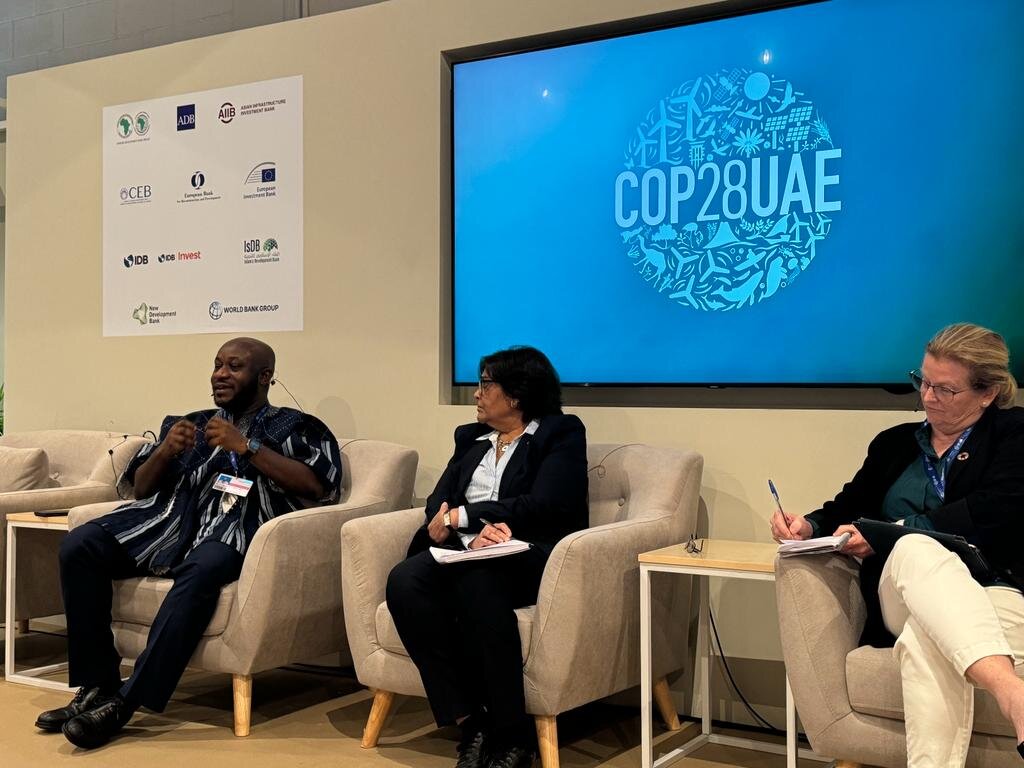Experts underscore the intrinsic links between gender equality, climate action, and financial inclusion saying the imperative lies in collective action, innovation, and policy advocacy to realize a sustainable, gender-responsive climate future in Africa.
The call was made earlier today during the MDB4e session, a significant side event converged to discuss the paramount issue of fostering gender-responsive climate finance in Africa. Among others, the session gathered notable panelists and engaged participants, all driven by a collective resolve to address the pressing challenges faced by women in accessing climate finance.
With Ingvild Solvang, the Director for Global Green Growth Institute as the session moderator the panel also included, Aaron Adu who is the Managing Director for Global SHEA Alliance, Jeannete Gurung, Executive Director of Women Organizing for Change in Agriculture and Natural Resources Management and Sunita Pitamber, Associate Director at the European Bank for Reconstruction and Development.
Throughout this session, experts and participants delved into the critical interplay between gender equality, climate finance, and the transformative potential of inclusive financial mechanisms. Insights were shared, and ideas sparked, igniting a discourse focused on reshaping financial instruments to empower women in sustainable climate practices.
For starters, Aaron Adu, Managing Director for Global SHEA Alliance, delineated the integral role of women in sustainable agriculture, focusing on SHEA production’s transformative potential. He stressed the necessity of financial support in empowering women and driving innovation in traditional sectors.
“It is of crucial importance to start programs with a country-level gender baseline assessment, ensuring tailored approaches to address gaps and deliver effective climate finance. This initiative should also be extended into the renewable energy sector, aiming to increase women’s participation as business leaders and owners in this critical field,” he argued.
Meanwhile, Jeannete Gurung, who is Executive Director of Women Organizing for Change in Agriculture and Natural Resources Management had a completely different perspective. “Sometimes I’m surprised they allow me in the room, this is a room of bankers and I come from a not for profit so I have a different perspective. I think as we fight against climate change, we need to look at every single actor in the universe and what they can do about it. And I’m worried that all of our focus on green entrepreneurs and climate entrepreneurs and agriculture entrepreneurs, leaves out a very large swath of the population, particularly in Africa and Asia.
For example, taking into account subsistence farmers that are not consumers of your bank’s products and services, but yet in my world are extremely important contributors to the agriculture, maintenance of farms, maintenance of forests, maintenance of water supplies, and have been doing this for years and years with their free labor and free knowledge that goes unrecognized, or uncompensated, Gurung noted.
Moreover, Sunita Pitamber, an Associate Director at the European Bank for Reconstruction and Development (EBRD), provided valuable insights into EBRD’s initiatives in gender-responsive climate finance. She emphasized aligning investments with climate action while integrating gender mainstreaming into projects.
“At the heart of advancing gender-responsive climate finance in Africa, the European Bank for Reconstruction and Development (EBRD) through its Green Economy Financing Facility, has been a vital force in supporting sustainable projects for over 15 years, with a keen focus on empowering women entrepreneurs. By extending climate finance to diverse applications, from energy efficiency to clean cooking solutions and home renovations, the bank addresses the multifaceted needs of women entrepreneurs, homeowners, and farmers,” she noted.
“Gender and human capital inclusion is central to every delivery and policy engagement through our investments at EBRD. So, this is really how we are a little bit organized to deliver on our mandate on gender equality. The bank has a very important mandate for green transition and now almost 50% of our investments are green or climate only due to gender equality.” Pitamber, added.
Later, the audience participated actively, raising crucial questions centered on the challenges faced by financial institutions in supporting smaller-scale women-led enterprises. These queries underscored the necessity for innovative financial instruments and collaborative efforts.
The discussion highlighted the urgent need for collaboration between MDBs, financial institutions, and grassroots organizations. Panelists emphasized the importance of fostering partnerships and innovative financial tools to bridge the gap in accessing climate finance for vulnerable communities, particularly women.



buy fb ad account account marketplace account market